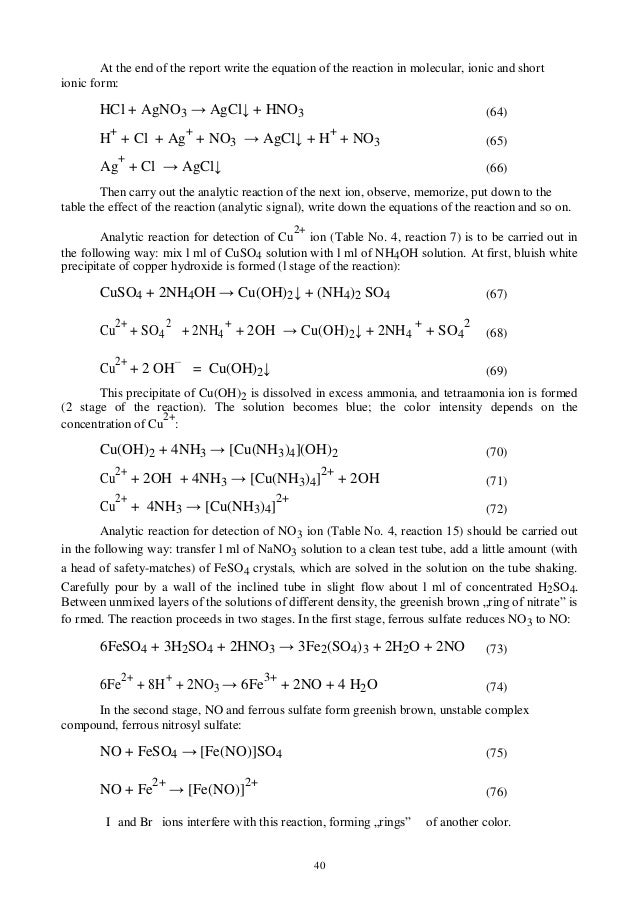- Practical Analytical Chemistry Lab Manual Pdf
- Analytical Chemistry Lab Practical
- Analytical Chemistry Lab Report Example
- Analytical Chemistry Lab Manual
Research has shown that students who have a written preparation for laboratory are safer, more efficient and have a better understanding of how the lab practices are connected to the regular chemistry classroom. In this laboratory manual, students are provided with analytical chemistry experiments including short introduction, purpose of each. This manual written to help first year veterinary medicine students in analytical chemistry laboratory work. Practical work, described in this book, includes classical, mostly used in practice, essential for VA absolvent methods of chemical and instrumental analysis.
ASAP Articles are edited and published online ahead of issue. See all articles.

Separation and Detection of Trace Fentanyl from Complex Mixtures Using Gradient Elution Moving Boundary Electrophoresis
Photo-Scanning Electrochemical Microscopy on the Nanoscale with Through-Tip Illumination
One-Step Microfluidic Purification of White Blood Cells from Whole Blood for Immunophenotyping
Self-Assembled Peptide Nanostructures for Photoelectrochemical Bioanalysis Application: A Proof-of-Concept Study
Lysosome-Targeting Red-Emitting Aggregation-Induced Emission Probe with Large Stokes Shift for Light-Up in Situ Visualization of β-N-Acetylhexosaminidase
Microfluidic Chip-Based Wearable Colorimetric Sensor for Simple and Facile Detection of Sweat Glucose
Nitrobenzoxadiazole Ether-Based Near-Infrared Fluorescent Probe with Unexpected High Selectivity for H2S Imaging in Living Cells and Mice
Synergy of Peptide–Nucleic Acid and Spherical Nucleic Acid Enabled Quantitative and Specific Detection of Tumor Exosomal MicroRNA
Featured Content
Recent highlights from the journal.
Editorials
What Does Your Future Academic Productivity Depend On?
As a research professor, one of my most important responsibilities is to train the next generation of academic and industrial scientists. Like many of my colleagues, a fraction of my former... by Jonathan V. Sweedler.
Reviews Special Issues
Analytical Chemistry Reviews address cutting edge topics.
Read the 2019 Special Issue.
Virtual Issues
Extracting More Information Using Less
Several times, through the period of my career, I’ve seen analytical problems that were considered difficult or even impossible, become routine. It is these advances and the information they provide that propels science and technology today.
Read the editorial by Daniel W. Armstrong.
Quick Links
Just Accepted ManuscriptsFeaturesPerspectives
Current Issue
The latest published issue of Analytical Chemistry. See all articles.
Connect with us!
Keep current with the latest ASAPs via ACS Mobile app and e-alerts, and follow us for updates on conferences, research highlights, and more.
Browse by Subject
Select a subject area to discover related terms and applicable articles.
All Subject Areas
See All (0)Most Read
Rankings are updated daily for previous 30 days (below) and previous 12 months. See all articles.
Naked-Eye Detection of Grapevine Red-Blotch Viral Infection Using a Plasmonic CRISPR Cas12a Assay
ODX: A Fitness Tracker-Based Device for Continuous Bacterial Growth Monitoring
Determination of Size and Concentration of Gold Nanoparticles from UV−Vis Spectra
What Does Your Future Academic Productivity Depend On?
Bacterial Extracellular Electron Transfer Occurs in Mammalian Gut
Quantification of Low Copy Number Proteins in Single Cells
Is Infrared Spectroscopy Ready for the Clinic?
Establishing Signature Fragments for Identification and Sequencing of Dityrosine Cross-Linked Peptides Using Ultraviolet Photodissociation Mass Spectrometry
Researchers
Authors
Reviewers
Librarians
- Are you interested in science?
- Do you like working with computers?
- Do you have good manual dexterity?
- Do you pay attention to details?
Analytical Chemists are in demand!
Practical Analytical Chemistry Lab Manual Pdf
Laboratory Technology – Analytical Chemistry is a three years technical program including 33 courses over 6 semesters divided into General Education and Concentration Education.
This program offers a large Choice of Careers: Pharmaceutical, Cosmetic, Petrochemicals, Agriculture and food, Environmental labs, Mines and metallurgy, Biotechnology, Aerospace and more!
Upon graduation, students can cumulate up to six months of work experience in the industry (students admissible in the Alternance Travail Études (ATE) program).
Why Laboratory Technology at Dawson?
Our program offers strong science background with emphasis on hands-on technology.
Analytical Chemistry Lab Practical
Main features: well-equipped laboratories, high teacher/student ratio, dedicated computer laboratories. Dawson is the only English CEGEP offering the program. Our program has close connections to industry, including remunerated internship through Alternance Travail Études (ATE) program.
Admission Requirements: Diploma of Secondary Studies (DES) with: Mathematics 564-506 or 565-506, Chemistry 551-504 | Overall average required: 65%.
Application deadline: March 1st (Fall semester).
Analytical Chemistry Lab Report Example
Program Information
Objectives of Program
- performing basic lab operations such as weighing, measuring precise volumes, heating, etc.
- testing for harmful micro-organisms found in industrial samples
- using conventional and modern procedures for the quantitative analysis and synthesis of organic and inorganic compounds
- proficiency in standard techniques used in industry
- using qualitative and quantitative methods to analyze samples in the biotechnology area
- expertise in compiling and processing laboratory data, writing scientific reports and submitting results using computerized software
- making products found in the marketplace
- maintaining laboratory instruments
- following GLP (good laboratory practice), SOP (standard operating procedures), and cGMP (current good manufacturing practices) compliance as well as respecting WHMIS (workplace hazardous materials information systems) regulations